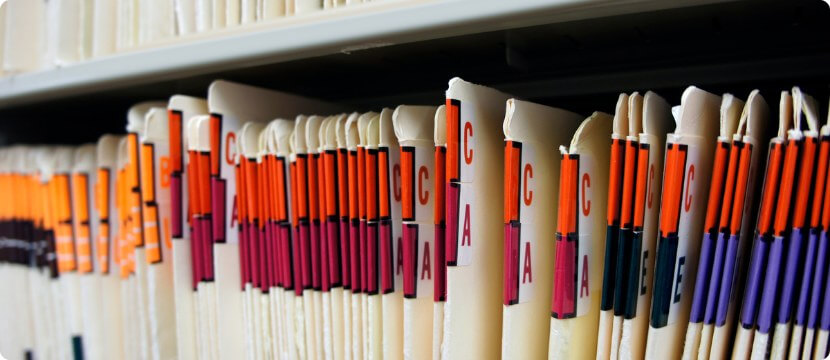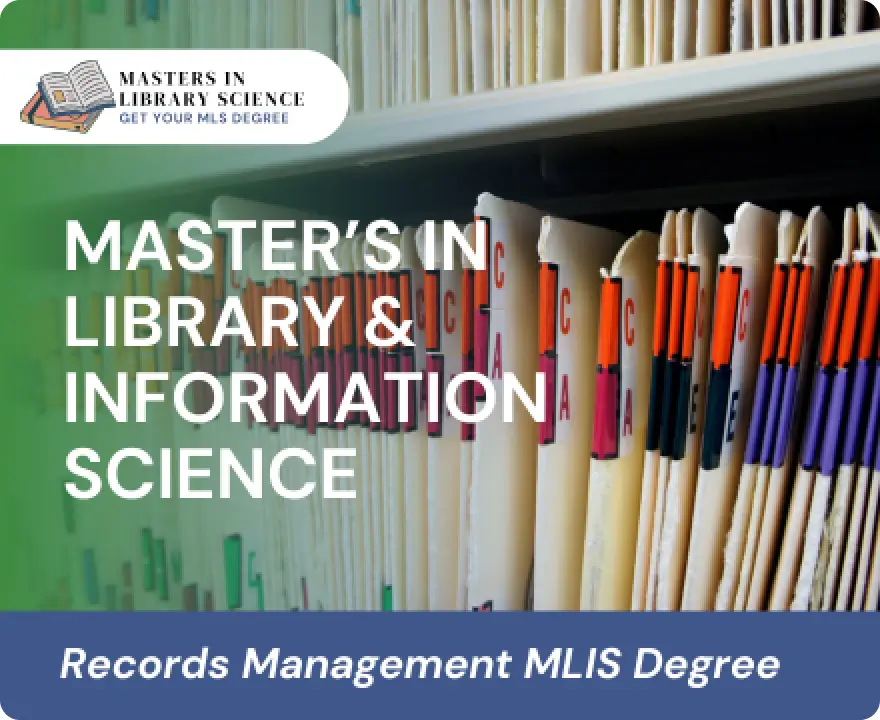Master's in Library Science in Records Management Degree Online
Find the best online Records Management MLIS program for you
- What is a Master’s Degree in Records Management?
- Admissions Requirements for a Master’s Degree in Records Management
- What Classes Will I Take in a Records Management Program?
- Careers in Records Management
- Online Records Management MLIS Degree Programs
- Finding the Right Online MLIS Degree for Records Management
What is a Master’s Degree in Records Management?
A Master’s in Records Management is an advanced degree focused on the strategies and technologies involved in organizing, preserving, and retrieving organizational records. This specialization teaches students how to manage the lifecycle of records, from creation and classification to storage and eventual disposal. In today’s digital world, records managers handle both physical and electronic records, ensuring data accuracy, security, and compliance with legal regulations.
Records Management is a vital function for any organization that handles sensitive or voluminous data. By combining core library science principles with specific records management training, students in this specialization learn how to support operational efficiency, mitigate risks, and maintain compliance with industry standards and laws. This program is ideal for individuals interested in working in corporate archives, government agencies, legal departments, or educational institutions where effective information management is critical.
A Master’s in Library Science (MLIS) with a specialization in Records Management equips students with the knowledge and skills to organize, store, and retrieve essential documents and data for organizations across various sectors. Records management plays a critical role in maintaining institutional memory, ensuring legal compliance, and supporting strategic decision-making. With businesses, government agencies, and nonprofits generating large amounts of data daily, records managers are essential in managing and securing these records for future use. For individuals interested in data organization, compliance, and digital recordkeeping, a specialization in Records Management within an MLIS program provides a rewarding career path that combines library science with information governance.
Admissions Requirements for a Master’s Degree in Records Management
Admission requirements for an MLIS degree specializing in Records Management are generally similar to other library science programs, though some institutions may seek candidates with prior experience in information management or compliance.
- Bachelor’s degree from an accredited institution, typically in any field, though a background in library science, information technology, or business can be beneficial
- Minimum GPA requirement, generally 3.0 or higher
- Statement of Purpose that describes the candidate’s interest in records management, relevant experience, and career goals
- Professional resume or CV that highlights any experience in records management, compliance, information technology, or related fields
- Letters of recommendation (usually 2-3) from academic or professional references who can speak to the candidate’s skills in data management or organizational roles
- GRE scores (some programs may waive this requirement)
- English proficiency test scores (e.g., TOEFL or IELTS) for international students
Prior experience in data management, compliance, or information technology can enhance an applicant’s profile, but a strong interest in information governance and organizational skills are often sufficient for admission.
What Classes Will I Take in a Records Management Program?
An MLIS program in Records Management combines foundational library science coursework with specialized classes on data governance, legal compliance, and digital records management. The curriculum is designed to teach students both traditional and digital records management practices, providing a comprehensive understanding of the tools and techniques used in this field. Programs typically require around 30-45 credit hours, and some may include a practicum or internship component that allows students to gain hands-on experience.
- Foundations of Library and Information Science
- Records Lifecycle Management: Covers the management of records from creation through retention, archiving, and disposal.
- Digital Records Management: Focuses on organizing, storing, and securing digital records, including email, databases, and multimedia files.
- Legal and Ethical Issues in Records Management: Teaches students about compliance with legal requirements, data privacy, and ethical considerations in managing records.
- Information Governance and Compliance: Explores policies and practices for managing information assets to meet organizational and regulatory requirements.
- Archival Methods and Preservation: Provides knowledge on preserving both digital and physical records, focusing on techniques for long-term preservation.
- Data Classification and Metadata Standards: Covers the principles of organizing information using metadata standards, taxonomies, and data classification systems.
- Enterprise Content Management Systems (ECMS): Introduces digital platforms used to manage records and information, including content management systems and digital archives.
- Risk Management and Disaster Recovery: Teaches methods for protecting and recovering records in cases of natural disasters, data breaches, or other threats.
- Practicum or Internship in Records Management: Offers students hands-on experience in a real-world setting, such as a corporate archive, government agency, or records management department.
These courses prepare students for the responsibilities of records managers, equipping them with the technical and organizational skills to manage records effectively and support organizational compliance.
Online Records Management MLIS Degree Programs
An online MLIS degree specializing in Records Management provides a flexible option for students balancing work, family, or other commitments. Online programs offer the same rigorous curriculum as on-campus programs, with courses in information governance, digital records management, and compliance. Interactive features, such as virtual discussions, online simulations, and digital resource access, help ensure that students receive a comprehensive education.
Many online programs offer local internship or practicum opportunities, allowing students to gain practical experience in nearby organizations. These hands-on experiences are essential in the field of records management, as they help students develop skills in organizing, securing, and retrieving information. Graduates of online programs are often well-prepared to work in records management, equipped with digital literacy and the knowledge of compliance standards required in today’s data-driven world.
Finding the Right Online MLIS Degree for Records Management
When selecting an online MLIS program in Records Management, prospective students should consider factors such as tuition, program length, and the availability of hands-on learning opportunities. Tuition for these programs can vary widely, ranging from around $12,000 to $40,000, with financial aid options often available. Full-time programs typically take 1-2 years to complete, while part-time options allow for a more flexible schedule.
Additionally, prospective students should research each program’s career support services, networking opportunities, and internship placements. Programs with strong connections to corporations, government agencies, or healthcare organizations may offer better job placement support, given that these sectors often employ records management professionals. By carefully evaluating these factors, students can find a program that aligns with their career goals and provides the training needed for a successful career in records management, where they can support organizations in managing information assets and ensuring data integrity.
How Long Does It Take to Complete a Library Science MLIS Program in Records Management?
Records Management programs are designed to be completed in 2 years of full-time study or 3-4 years for part-time students, requiring around 36-42 credit hours. Programs may include specialized courses in compliance, data governance, and electronic records management.
Internship Requirements for Completing a MLIS in Records Management
Internships for this specialization often occur in corporate, government, or healthcare environments. Tasks include implementing records retention policies, ensuring compliance with data regulations, and organizing digital archives. Students complete 100-150 hours of internship work, often gaining exposure to high-level records management systems and software.
Careers in Records Management
- Records Manager: Records managers oversee the management of records throughout their lifecycle, including classification, storage, and eventual disposal. They ensure records are secure, compliant, and accessible when needed.
- Average Salary for a Records Manager: $55,000 – $75,000 annually
- Organizations Hiring Records Managers: Government agencies, corporations, law firms, healthcare organizations
- Information Governance Specialist: Information governance specialists focus on developing and enforcing policies that govern data management, privacy, and regulatory compliance within an organization.
- Average Salary for a Information Governance Specialist: $60,000 – $85,000 annually
- Organizations Hiring Information Governance Specialists: Large corporations, financial institutions, healthcare providers, consulting firms
- Digital Records Archivist: Digital records archivists specialize in managing electronic records, ensuring they are organized, accessible, and preserved for future use. They often work with digital asset management systems and ensure data integrity.
- Average Salary for a Digital Records Archivist: $55,000 – $75,000 annually
- Organizations Hiring Digital Records Archivists: Corporate archives, government agencies, universities, digital libraries
- Compliance Officer: Compliance officers ensure that organizations adhere to regulations related to information security, data privacy, and records retention. They play a key role in preventing legal issues and maintaining ethical standards in data management.
- Average Salary for a Compliance Officer: $65,000 – $90,000 annually
- Organizations Hiring Compliance Officers: Financial institutions, healthcare organizations, insurance companies, multinational corporations
- Archivist Managers: Archivist-records managers handle both archival materials and active records, overseeing long-term preservation as well as daily record-keeping practices. They often work in academic, corporate, or government settings.
- Average Salary for a Archivist Managers: $50,000 – $70,000 annually
- Organizations Hiring Archivist Managers: University archives, state archives, historical societies, cultural organizations
- Records Management Consultant: Records management consultants provide specialized expertise in records management policies, digital archiving, and compliance. They work with clients to develop effective records management programs and often travel to client sites
- Average Salary for a Records Management Consultant: $60,000 – $85,000 annually (varies based on projects and clients)
- Organizations Hiring Records Management Consultants: Consulting firms, private practice, records management software providers




Master’s in Library & Information Science
Online MLS/MLIS Degrees
- Best Online MLS/MLIS Degree
- Archival Studies Degree Online
- Academic Librarianship Degree
- Children & Youth Services Degree
- Cultural Heritage Preservation Degree
- Digital Libraries Degree
- Law Librarianship
- Public Librarianship Degree
- School Librarianship Degree
- Book Arts Degree
- Music Librarianship Degree
- Records Management
